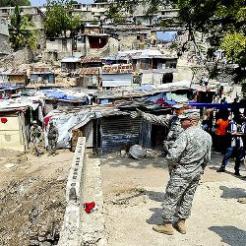Charities face frustrating legal barriers to housing provision following a disaster, being forced to go with the political flow, says Andrew Chaggar. But tensions are high in Haiti, he warns, and time is running out for the 634,000 people still in survivor camps.
Last January I wrote a blog about land rights. In that blog I discussed why they are often so difficult to establish in disaster zones and, as a result, why progressing with permanent reconstruction is often so difficult.
Essentially without the clear legal right for people to reside on land the threat of eviction is always present. Consequently investment in permanent homes is fraught with risk for organisations seeking to provide housing with donors’ money.
Navigating the complexities of land issues is difficult and can cause long delays even for the largest and most experienced charities. For example in Haiti the Red Cross announced the handover of its first permanent home on the 15 June this year, over eighteen months after the earthquake struck.
Land issues are one of the main reasons why so many earthquake survivors are still living in tent camps and are likely to remain there into the future. Not only does the total population of camps, officially 634,000, remain high but the rate of departure from them also fell recently. According to the International Organisation for Migration (IOM) the total camp population fell by only 7 per cent between April and May - one of the slowest rates since last September - indicating that survivors are finding it increasingly difficult to find alternative housing.
Worryingly the IOM also reports that many of the camp closures that have occurred are the result of forced evictions. More disturbing still is that these evictions are often being carried out by the Haitian authorities. While some of the most controversial evictions have been carried out by mayors at the local level, the new national leader Mr Martelly has also been criticised for pledging “to close all camps within six months without providing a concrete plan for re-housing”.
Legal barriers to construction by charities
This stance by the government is particularly problematic because, as I stated last January, land rights are an issue that have to be tackled politically. There are many charities in Haiti that have both the desire and capacity to scale up construction, but they cannot directly legislate to speed up the process and their indirect advocacy work is often also constrained by the law in their own countries.
This is because the legalities of humanitarian action can essentially be traced back to the fourth Geneva Convention which makes several explicit references to its “impartial” nature. As land rights are a political issue they are inherently not impartial.
Overall, the further organisations stray from immediate life-saving relief towards longer-term issues, such as permanent housing and the need for land reform to provide it, the more uncertain their legal mandate becomes. For example Oxfam has had past problems with the UK Charity Commission over the “Freedom from Hunger” campaign in the 1960s and its advocacy work in Israel and Cambodia in the 1980s.
Returning to Haiti all of these issues have far-reaching implications for aid providers and those they seek to support following the earthquake.
One of the reasons that so many people died in the disaster is that many of Haiti’s poor migrated to the city in search of economic opportunity. Once there they were forced to live in unsafe geographic locations in overcrowded and poorly constructed buildings that were essentially death-traps.
Because charities have a legal obligation to avoid political issues, tackling root causes such as land rights is very difficult. As a result in the disaster’s aftermath the best case scenario for aid organisations is often to provide basic camp services to survivors while the struggle to find secure land for housing continues to rely on governmental decisions.
This is far from ideal as displacement camps are also highly vulnerable places for people to live. However, the highly visible nature of camps at least keeps the issues on the table while suitable housing alternatives are sought.
The worst case scenario is that the issue of land rights is not tackled and survivors are forced, through eviction, into the shadows of the city. If this happens they will seek whatever shelter they can and wait for the next disaster to strike.
Andrew Chaggar is executive director of European Disaster Volunteers









